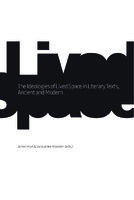The Ideologies of Lived Space in Literary Texts, Ancient and Modern
Author(s)
Heirman, Jo
Klooster, Jacqueline
Language
EnglishAbstract
In a brief essay called Des espaces autres (1984) Michel Foucault announced that after the nineteenth century, which was dominated by a historical outlook, the current century might rather be the century of space. His prophecy has been fulfilled: the end of the twentieth century witnessed a ‘spatial turn’ in humanities which was perhaps partly due to the globalisation of our modern world. Inspired by the spatial turn in the humanities, this volume presents a number of essays on the ideological role of space in literary texts. The individual articles analyse ancient and modern literary texts from the angle of the most recent theoretical conceptualisations of space. The focus throughout is on how the experience of space is determined by dominant political, philosophical or religious ideologies and how, in turn, the description of spaces in literature is employed to express, broadcast or deconstruct this experience. By bringing together ancient and modern, mostly postcolonial texts, this volume hopes to stimulate discussion among disciplines and across continents. Among the authors discussed are: Homer, Nonnus, Alcaeus of Lesbos, Apollonius of Rhodes, Vergil, Herodotus, Panagiotis Soutsos, Assia Djebar, Tahar Djaout, Olive Senior, Jamaica Kincaid, Stefan Heym, Benoit Dutuertre, Henrik Stangerup and David Malouf.
Keywords
lived space; ideology; chronotope; literary theoryDOI
10.26530/OAPEN_498512OCN
945782719Publisher
Academia PressPublisher website
https://www.academiapress.be/nlPublication date and place
Gent, 2013Classification
Western Europe
English
BCE period – Protohistory
19th century, c 1800 to c 1899
20th century, c 1900 to c 1999
For adult emergent readers
Literary theory


 Download
Download Web Shop
Web Shop